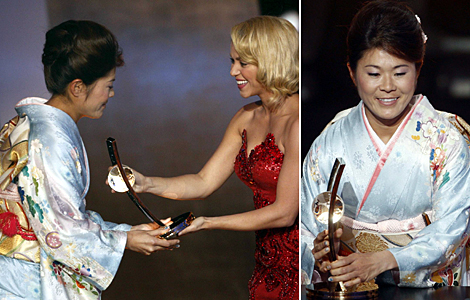Public gets direct line to senior officials
Updated: 2012-01-12 07:49
By Guo Nei (China Daily)
|
|||||||||
BEIJING - Deng Ningxi, the owner of a massage center in Meishan, Sichuan province, that employs blind people, mustered up his courage and called the cell phone of Zeng Lebin, chairman of Meishan's Disabled Persons' Federation.
The massage center has been doing poorly since 2010. Deng, 41, who is also blind, cannot make ends meet, but he doesn't want to close the business. Working at the center is the sunshine in the lives of his employees.
Zeng listened to Deng's worries and later contacted blind-massage training centers to get Deng's staff lessons, and he also promoted Deng's center to employees of other government departments.
"Zeng is friendly and approachable. I'm grateful he's willing to take pains to help me," Deng said.
Deng got the cell phone number from Meishan Daily, which last week updated a list of the cell phone numbers of 283 senior officials of the Meishan government and associated officials in districts and counties, including the mayor and the Party leader. The telephone numbers are also available on mshw.net, the newspaper's Web portal.
According to Li Zhuo, director of the Meishan publicity department, the initiative was undertaken to increase and deepen the communication between the senior officials and the general public they work for.
Meishan is not the only city with such an initiative. In 2008, Kunming, in Yunnan province, published the office phone numbers of its government officials, and it updated the list of contacts in 2011. Both Shanxi province and Changsha, Hunan province, published the cell phone numbers of their government officials in 2011, with Shanxi attaching e-mail addresses as well.
Yu Zisheng, the chief of Meishan bureau of civil affairs, takes on average five phone calls a week. Most of the callers are poor and want information on applying for government financial aid.
Yu conceded that these people could easily have found that information on the bureau's website.
"But people living in poverty usually don't have access to the Internet. Besides, it's common among the general public to think that a senior official is more credible and helpful," Yu said.
Li is confident that the measure has been helping. "Residents have been given more channels to report their problems and supervise government performance," he said.
However, Jia Xijin, an associate professor at the school of public policy and management at Tsinghua University, wonders whether those numbers are for work only, and believes that the numbers that should be made public are those of the deputies to the people's congress, whose duties are mainly to serve as a bridge between people and functionaries.
Li Zhuo said that the senior officials are required to keep their phone on around the clock. "But the residents are considerate and call me during office hours only," Li added.
But Yu Zisheng believes the benefits of the service outweigh the possible inconvenience. After helping an ex-soldier get his house repaired, "we're helping a group of people after talking with a member of the group", he said. "This is the real purpose of enabling a person from the general public to talk to officials."
- Wen looks at the big picture of Sino-US co-op
- FM warns on exploiting Tibet issues
- Iranian nuke scientist killed in blast
- Weibo gets world talking with China
- 1m affected by drought in E China
- Officials visit man jailed in ROK
- Wen urges US to respect China's core interests
- China refutes colonialism claims
Hot Topics
Kim Jong-il, Mengniu, train crash probe, Vaclav Havel, New Year, coast guard death, Internet security, Mekong River, Strait of Hormuz, economic work conference
Editor's Picks

|

|

|

|

|

|







